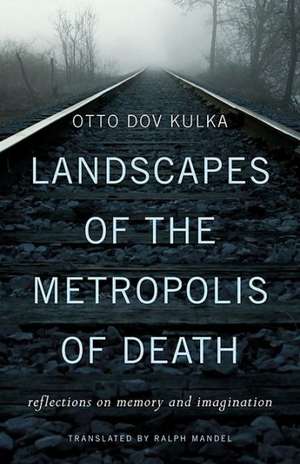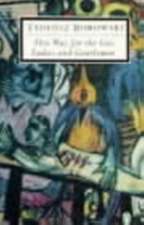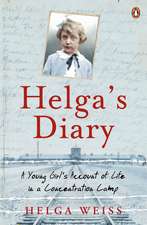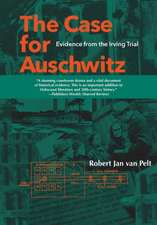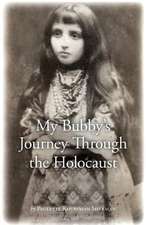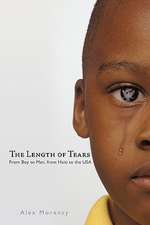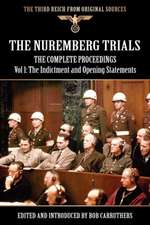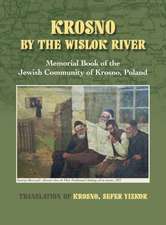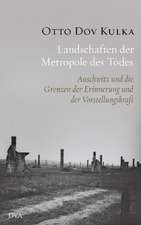Landscapes of the Metropolis of Death: Reflections on Memory and Imagination
Autor Otto Dov Kulka Traducere de Ralph Mandelen Limba Engleză Hardback – 18 mar 2013
Historian Otto Dov Kulka has dedicated his life to studying and writing about Nazism and the Holocaust. Until now he has always set to one side his personal experiences as a child inmate at Auschwitz. Breaking years of silence, Kulka brings together the personal and historical, in a devastating, at times poetic, account of the concentration camps and the private mythology one man constructed around his experiences.
Auschwitz is for the author a vast repository of images, memories, and reveries: the Metropolis of Death over which rules the immutable Law of Death. Between 1991 and 2001, Kulka made audio recordings of these memories as they welled up, and in "Landscapes of the Metropolis of Death" he sifts through these fragments, attempting to make sense of them. He describes the Family Camp s children s choir in which he and others performed Ode to Joy within yards of the crematoria, his final, indelible parting from his mother when the camp was liquidated, and the black stains along the roadside during the winter death march. Amidst so much death Kulka finds moments of haunting, almost unbearable beauty (for beauty, too, Kulka says, is an inescapable law).
As the author maps his interior world, readers gain a new sense of what it was to experience the Shoah from inside the camps both at the time, and long afterward. "Landscapes of the Metropolis of Death" is a unique and powerful experiment in how one man has tried to understand his past, and our shared history."
| Toate formatele și edițiile | Preț | Express |
|---|---|---|
| Paperback (1) | 56.04 lei 24-30 zile | +16.90 lei 4-10 zile |
| Penguin Books – 26 feb 2014 | 56.04 lei 24-30 zile | +16.90 lei 4-10 zile |
| Hardback (1) | 267.04 lei 3-5 săpt. | |
| Belknap Press – 18 mar 2013 | 267.04 lei 3-5 săpt. |
Preț: 267.04 lei
Nou
51.11€ • 55.54$ • 42.96£
Carte disponibilă
Livrare economică 31 martie-14 aprilie
Specificații
ISBN-10: 0674072898
Pagini: 127
Dimensiuni: 143 x 222 x 15 mm
Greutate: 0.29 kg
Editura: Belknap Press
Descriere
Notă biografică
Recenzii
Of the many accounts of survival in the Nazi concentration camps - Jewish and non-Jewish - few approach Otto Dov Kulka's for the quality of its writing and attempt to understand the nature of contemporary barbarism ... one of the essential books of our age; not since Primo Levi'sThe Periodic Tablehas there been such a powerful holocaust memoir ... the writing, at times trance-like, creates an extraordinary sense of communion and intimacy with the reader ... in pained but lucid prose Kulka seeks to understand how his memory processed the trauma of Auschwitz
'A poetic masterpiece unlike anything else written on the subject'
This is one of the most remarkable testimonies to inhumanity that I know. The deeply moving recollections of Dov Kulka's boyhood years in Auschwitz, interwoven with reflections of elegiac, poetic quality, vividly convey the horror of the death-camp, the trauma of family and friends, and the indelible imprint left on the memory of a young boy who became a distinguished historian of the Holocaust. An extraordinarily important work which needs to be read
Astonishing ... [Landscapes] is, quite simply, extraordinary ... a sort of Modernist precipitate of a historical work, something strange and powerful formed from, but separate to, the solution of history ... I can't see how this book could be bettered
Almost unclassifiable ... Nothing else I have read comes close to this profound examination of what the Holocaust means ... [Kulka's] journey strikes me as a quest similar to the attempt to describe the face of God or the structure of the universe. They are too vast and too mysterious. Not that this stops us, or this author, from trying
Primo Levi's testimony, it is often said, is that of a chemist: clear, cool, precise, distant. So with Kulka's work: this is the product of a master historian - ironic, probing, present in the past, able to connect the particular with the cosmic. His memory is in the service of deep historical understanding, rendered in evocative prose that is here eloquently translated from Hebrew
Beautiful, startling ... This is a great book: read it. And be grateful - its publication is, in every possible sense, a miracle ... It is the strange and shocking paradox, this child's world constructed in such proximity to death, that makes the book so startling and so beautiful. Every incident is, in effect, seen twice: through the eyes of the historian and the eyes of a boy ... This is not history, it is something else... his words enter the wider sphere of literature
Kulka's reflections have an unsettling rawness ... yet even in Auschwitz, there are moments of protest, black humour and beauty ... This is a grave, poetic and horrifying account of the Holocaust which does not so much revisit the Auschwitz of the past, but the Auschwitz of Kulka's inner world
This is not so much a book about Auschwitz as one about coming to terms with the shock of survival ... Amid fragmentary, digressive impressions are images of terrible poetic concreteness ... What, ultimately, makes Kulka's book unlike any other first-hand account written about the camps is the authenticity of its vision of an 11-year-old boy... He has done the rest of us - and the world - so great a kindness by writing his book ... offer[ing] the barest glint of sunlight amid a thunderous darkness
A book of moments, hauntings and dreams ... it is unremitting and touches us all [with] a hallucinatory power
Otto Dov Kulka's brief, beautiful and unsettlingLandscapes of the Metropolis of Deathbrings together childhood memories of Auschwitz with the reflections of a historian who has spent his life working on the Holocaust: a masterly interrogation of memory and the limitations of historical detachment
A historian's memoir of Auschwitz, without sentimentality and almost without outrage, since it is an examination of a place where all human reactions are inadequate ... an overwhelming testimony to the human love of truth
For the first time, [Kulka] has turned his academic eye inward to explore as unflinchingly as possible the ways in which his childhood encounter with Auschwitz has affected him.Landscapes of the Metropolis of Deathmakes for deeply disturbing but ultimately very rewarding reading, and is unlike any Holocaust memoir I have ever come across ... The book is not a memoir in the conventional sense, but an extraordinary collection of some of the memories, ideas and dreams that make up Kulka's internal landscape
In this short, powerful memoir, every word tells its story
The term memoir barely seems adequate to the introspective, often poetic, sometimes hallucinatory moments that [Landscapes] captures ... such an important contribution to the literature on the Holocaust ... [it] unsettles presuppositions about the camp and its lasting psychological effects so thoroughly that even a reader steeped in the Holocaust canon is likely to experience a sense of defamiliarisation
Otto Dov Kulka's name should be as well known as Primo Levi's as a supreme writer of personal experience of the hell of Auschwitz. But hisLandscapesof the Metropolis of Deathis unlike any other Holocaust writing because it faithfully reproduces the sensibility of the eleven year old boy that Kulka was at the time. So, unnervingly there are blue skies and daring games and actual school classes along with the smell of the smoke of incinerated bodies. More than other writing except Levi's Kulka's book, excavated with great pain via his attempted therapy of memory, sets you, the readerthere.It is an imperishable achievement born of strength of mind and body and a kind of glowing inner vitality that I was lucky enough to encounter when I met him a few years ago. Profound scholar, extraordinary writer some part of him remained miraculously boyish in his warm vitality.
